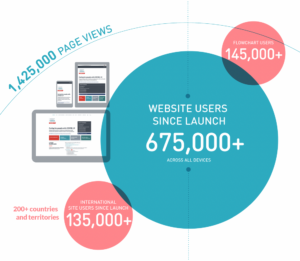By Kayla Voss
A global health crisis demanded unity to aid an Australian healthcare system primed to bear the weight of its consequences. Three years on, the National Clinical Evidence Taskforce is celebrating our third anniversary by reflecting on the incredible efforts of our members to deliver living COVID-19 guidelines for Australian clinicians.
On 11 March 2020, the World Health Organisation (WHO) declared COVID-19 as a worldwide pandemic. On 23 March 2020, the National COVID-19 Clinical Evidence Taskforce was formed to provide clinical guidelines to our healthcare workers to treat people with COVID-19.
 Three expert panels, our Guidelines Leadership Group (GLG), and our Steering Committee approved the first set of COVID-19 recommendations for their publication on 4 April 2020.
Three expert panels, our Guidelines Leadership Group (GLG), and our Steering Committee approved the first set of COVID-19 recommendations for their publication on 4 April 2020.
From these humble beginnings, the Taskforce has created 15 expert panels, developed 23 clinical flowcharts, updated the COVID-19 clinical guidelines over 100 times with more than 200 recommendations, and expanded a clinical scope to include guidance for the care of children, adolescents, adults, pregnant or breastfeeding women, and older people.
In the early days of the Taskforce, the turning point moment for an initiative which was determined to explore the possibilities of multidisciplinary collaboration between key healthcare bodies and clinical experts, is best described by our Guidelines Leadership Group Chair, Associate Professor Sutapa Mukherjee.
“When we finally reviewed evidence that showed we had a treatment we could recommend for unwell patients, that was a game changer for me, and I think we all breathed a huge sigh of relief,” she said.
Despite the desperation to find and provide a treatment recommendation earlier, a faithful approach to the living evidence process paid dividends with high-quality clinical recommendations.
Dr Lorraine Anderson, a valued member of our Paediatric and Adolescent Care Panel, lauds the living recommendation process which the Taskforce has developed and modified over the journey.
“I was blown away with the level of scrutiny over the words and advice. This was great and the other clinicians in the country can feel safe knowing that these guidelines have been so well scrutinised and are living documents,” Lorraine said.
While the level of scrutiny has remained paramount in the Taskforce’s recommendation process, the evolution of our living model has generated consistent praise from our panellists and members.
Professor Caroline Homer and Associate Professor Penny Burns have experienced the genuine journey of the Taskforce, with both contributing significant volunteer hours across multiple expert panels since the Taskforce’s inception.
Burns, who is a member of our Primary and Chronic Care Panel, Paediatric and Adolescent Care Panel, Pathways to Care Working Group and Infection Prevention and Control Panel, applauds the adaptability of the Taskforce throughout our three years.
“The topics addressed by the Taskforce evolved as the pandemic evolved. New panels formed and those no longer needed were put on the shelf. The evidence provided followed the needs of the frontline clinicians as their needs evolved,” Penny said.
Homer, who serves as our Steering Committee Chair, Pregnancy and Perinatal Co-Chair and Guidelines Leadership Group member, also compliments the Taskforce’s flexibility.
“The process has become more streamlined, sophisticated and fit for purpose. New ways of doing things have evolved and are now becoming part of the national and global architecture of guideline development,” she said.
The professional achievement of the Taskforce is often a ‘pinch me’ moment, particularly for our staff, and it’s easy to focus on what our panels and members have achieved together in a purely professional lens.
We could focus on “the true multidisciplinary nature of the members and panels, and the sense of real collaborative effort” or “the speed at which evidence is reviewed, presented and recommendations are proposed and approved”, or even “the significant value of having consumers and the community as an integral part of the guidelines”, which Homer praises.
However, this organisation was formed in the most unique of circumstances and the meaning of the Taskforce and the relationships that have been created during these few years are just as valuable.
Mukherjee says she has taken immense appreciation for the opportunity to work with so many talented people, particularly the women on the Taskforce.
“It is rare to find equal numbers of males and females on senior committees and it has been refreshing to work with all the women who lead, provide expertise and keep turning up each week. They continue to inspire and empower me to be the best I can be.”
Casting our minds back to the times of 2020 it is almost unbelievable in its reality, and the uniqueness of our situation galvanised our members.
“I think through the Victorian COVID lockdowns in 2020 and 2021, the sense of support and camaraderie that was expressed through weekly meetings was wonderful. I really felt part of a national community that was trying to do good in a time of huge uncertainty and challenge. The meetings were always a highlight in those tough weeks,” Homer said.
The future of the Taskforce, and the capacity in which it operates, is not entirely clear as we celebrate an enormous three years. However, the success story of the Taskforce is a powerful argument to maintain and expand the scope of this work.
“The Taskforce proved its value providing rapid authoritative up-to-date synthesis of evidence that was pragmatic, practical and applicable to those who need it,” Burns said.
Mukherjee recognises the crucial need for living evidence models to provide guidance since “most [clinicians] do not have the time to sift through evidence on new therapies.”
Although the future is uncertain, the achievements of the Taskforce, alongside our 35 member organisations and over 200 expert volunteers, is unprecedented in clinical guideline development.
It has been an incredible ride over the past three years and the Taskforce is lucky to share the celebrations with our members and all the wonderful clinicians who have supported our work.